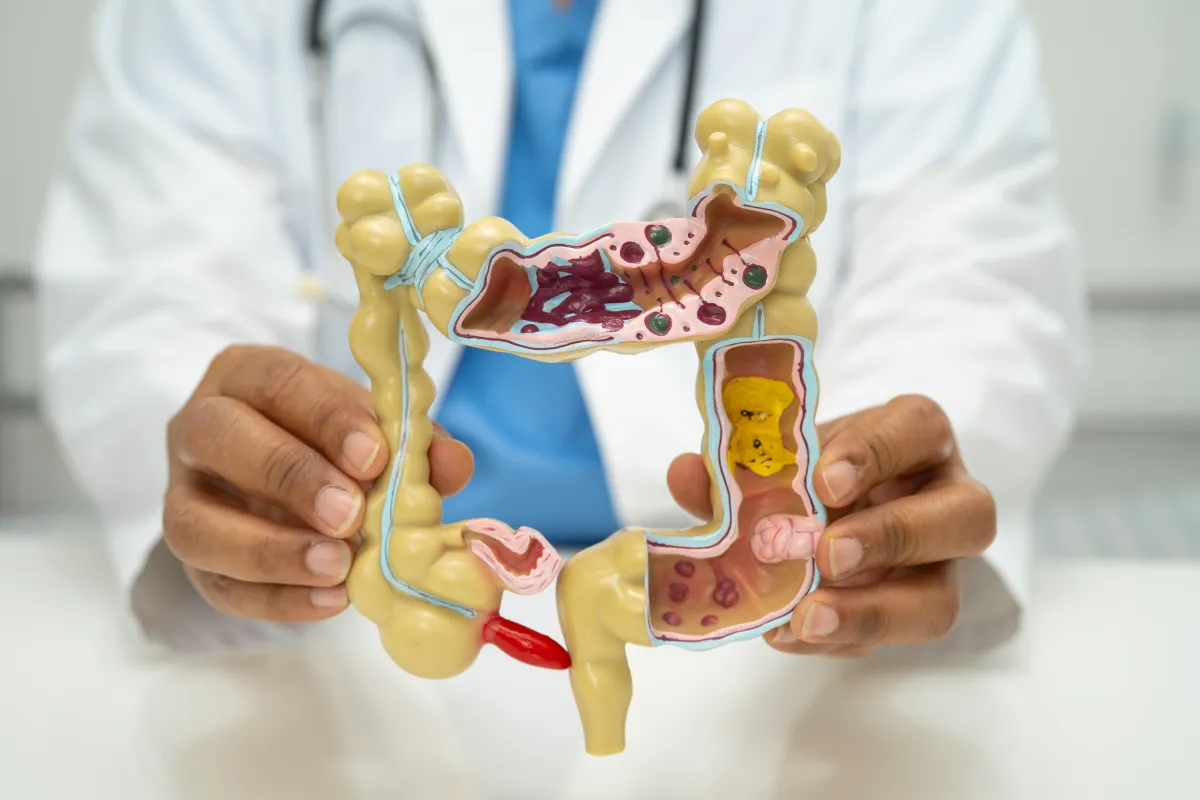Colitis: Gut Health
Colitis is an inflammation of the colon, causing abdominal pain, diarrhea, and bleeding, managed through diet, medication, and treating underlying causes.

Role of Gut Imbalances in Colitis:
The role of gut imbalances in colitis, particularly in inflammatory bowel diseases like Crohn's disease and ulcerative colitis, is significant and multifaceted. These conditions are marked by inflammation of the gut lining, leading to sores or ulcers in severe phases.
A central factor in these gut imbalances is the alteration or disruption of gut flora, the beneficial bacteria that reside in the intestinal lining. These bacteria are essential for maintaining the structural integrity and function of the digestive tract. When the balance of these beneficial bacteria is disturbed, it can lead to structural changes within the gut epithelium, including the degeneration of villi. This degeneration impairs digestion and absorption, resulting in malabsorption issues, nutritional deficiencies, and the development of food intolerances.
Additionally, an imbalance in gut flora can contribute to a condition known as "leaky gut." This occurs when the intestinal wall becomes damaged and permeable, allowing substances that are typically barred from entering the bloodstream to pass through. This permeability can elicit an immune response, heightening inflammation and exacerbating colitis symptoms.
The imbalance between Th1 and Th2 immune responses is another factor that arises from gut dysbiosis. The gut flora plays a critical role in maintaining immune system balance. When gut balance is compromised, it weakens the body's immune defenses, increasing the likelihood of chronic inflammation and the progression of colitis. In summary, maintaining healthy gut flora is crucial in preventing and managing colitis. A balanced gut microbiome supports immune system health and helps prevent chronic inflammation, which is central to the symptoms and advancement of colitis.
Description of Colitis:
Colitis is an inflammation of the inner lining of the colon, which is part of the large intestine. It can manifest in various forms, including ulcerative colitis and microscopic colitis, and can cause symptoms such as abdominal pain, cramping, diarrhea, and bleeding with elimination.
The condition can have multiple causes, including infections, inflammatory bowel disease (such as Crohn's disease and ulcerative colitis), ischemia (lack of blood supply), or even allergic reactions.
Different types of colitis might be associated with different blood types and can have varying symptoms, like the more ulcerative form causing bleeding in Type Os due to a lack of adequate clotting factors, while Types A, B, and AB might experience more mucous colitis without visible blood. Managing colitis often involves dietary adjustments, medications, and addressing any underlying causes or stress factors.
Restore Gut Function and Ease Symptoms of Colitis
Restoring gut function and alleviating symptoms of colitis requires a combination of dietary changes, probiotic supplementation, and lifestyle adjustments.
Below are some strategies that can be helpful:
1. Incorporate Probiotics and Balance Gut Flora: By introducing probiotics, you can help populate your gut with beneficial bacteria that support digestion and reduce inflammation. Consider adding probiotic-rich foods to your diet, such as sauerkraut juice, fermented dairy products like kefir, sour cream, and yogurt. It's crucial to introduce these foods gradually to ensure they are well tolerated and to avoid any adverse reactions.
2. Adjust Dietary Habits: Diet plays a significant role in managing colitis. Start with consuming clear meat stocks if diarrhea is severe and gradually introduce probiotic foods. Avoid foods known to trigger intolerances or irritations in your digestive tract. Finally, opt for high-fat, low-protein dairy options cautiously, as some, like high-protein cheeses, might exacerbate symptoms.
3. Utilize Supplements: You might consider supplements geared towards easing inflammation or aiding digestion, like digestive enzymes. However, always consult a healthcare provider before starting any new supplement regimen to tailor it to your specific needs.
4. Manage Stress: Stress significantly impacts gut health. Creating a calm mealtime setting and practicing stress-reduction techniques can support healthy digestion and reduce symptoms of colitis.
5. Use of Enemas: Although not universally popular, enemas can offer quick relief from severe constipation and serve as a method to directly introduce probiotics into the bowel.
6. Maintain Adequate Hydration: Ensure you are drinking enough fluids to keep your digestive system functioning optimally, which in turn helps in easing colitis symptoms.
7. Gradual Introduction of Foods: When introducing new foods, do so gradually. Foods like egg yolks offer high nutritional value and are generally easy to digest, but should be added to the diet cautiously to monitor tolerance. In managing colitis, it is crucial to work with healthcare providers or specialists in gut health to develop a plan tailored to your specific condition and to monitor the effects of dietary or lifestyle changes.
